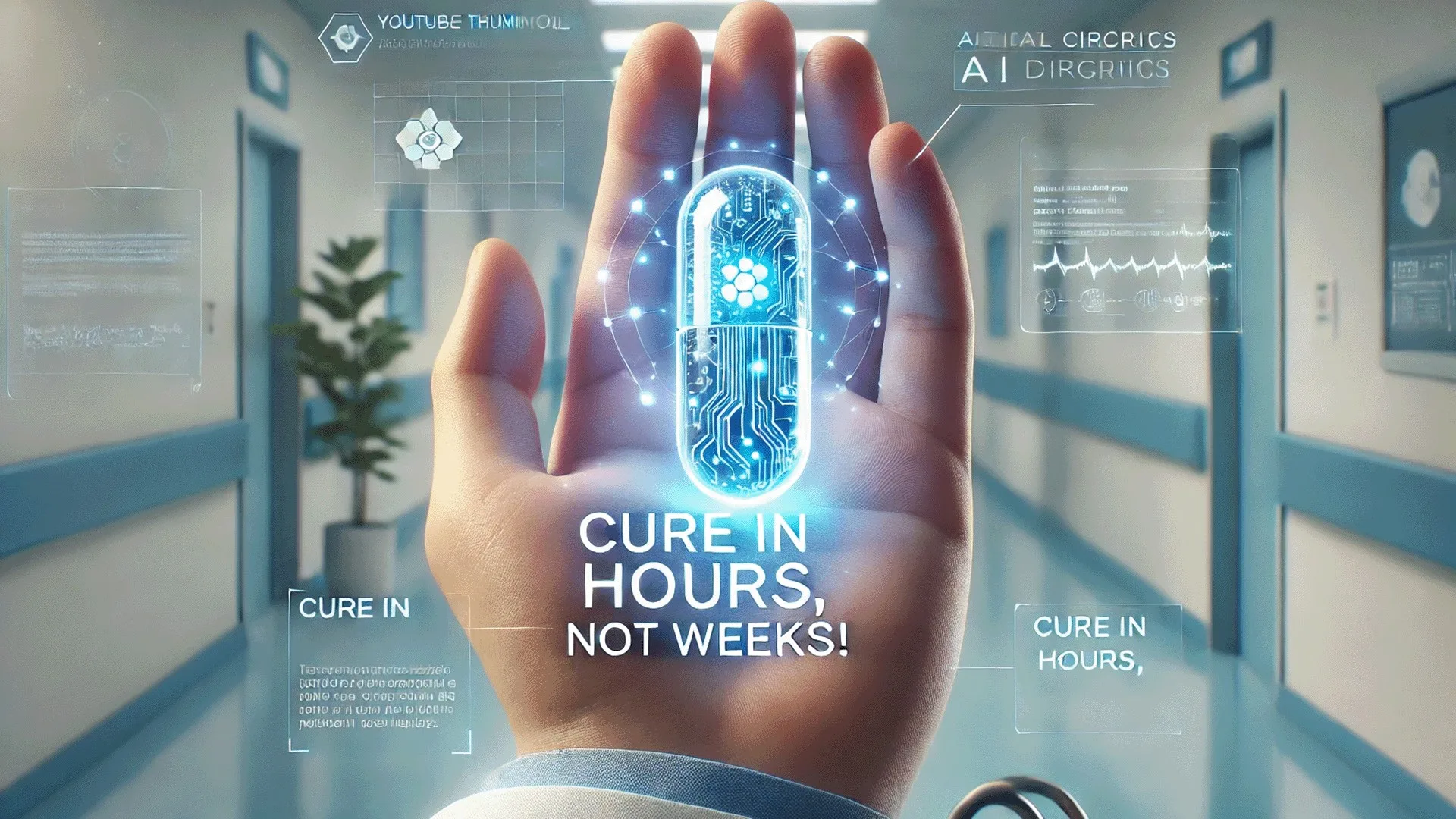Imagine a world where debilitating illnesses are met not with anxious trips to crowded emergency rooms, but with a simple swallow of a cutting-ed
Imagine a world where debilitating illnesses are met not with anxious trips to crowded emergency rooms, but with a simple swallow of a cutting-edge pill. The AI medicine pill, an extraordinary blend of artificial intelligence, nanotechnology, and quantum computing, is set to redefine how we perceive diagnosis and treatment. This revolutionary concept promises precise, personalized, and lightning-fast healthcare solutions. But how does it work, and what would the global implications be?
How the AI Medicine Pill Works
The AI medicine pill is the result of merging several frontier technologies, each contributing a vital role:
1. Diagnosis Through Nanoscale Sensors
Once swallowed, the pill activates nanoscale sensors that disperse through the bloodstream. These minute devices gather comprehensive data, from vital signs and chemical imbalances to the presence of pathogens and cellular anomalies. This treasure trove of biological information is the foundation upon which the pill’s diagnostic power is built.
2. Quantum Computing for Unparalleled Analysis
The collected data is sent in real-time to an advanced quantum computer. Unlike traditional computers, which process information sequentially, quantum computers leverage superposition and entanglement, allowing them to analyze complex biological interactions at an extraordinary pace. This capacity is crucial for identifying rare and multifaceted conditions that could take weeks or even months for traditional methods to diagnose.
Example Scenario: In the case of a complex autoimmune disorder, traditional computational biology might require days of simulations to understand protein misfolding and potential treatments. A quantum computer could achieve this analysis in mere hours, potentially saving a life by accelerating the response time.
3. Tailored Treatment Plans
With the diagnosis complete, AI algorithms create a personalized treatment regimen targeting the specific issue at hand. Whether it’s a viral infection, bacterial invasion, or genetic anomaly, the AI formulates a tailored solution and sends the treatment blueprint back to the pill.
4. Direct Administration of Nanomedicines
The final phase involves the pill releasing a carefully designed combination of nanomedicines that target the affected areas in the body. These nanomedicines deliver treatment directly to cells or tissues, ensuring maximum efficacy and minimizing side effects. The result? Swift, comprehensive recovery without the typical delays associated with generic or broad-spectrum treatments.
The Quantum Computing Advantage
To grasp the true power of the AI medicine pill, it’s essential to understand why quantum computing is such a game changer. Traditional computers, even the most powerful supercomputers, handle data linearly and often struggle with simulations that require vast amounts of processing power, such as protein folding or genetic interactions.
Key Benefits of Quantum Computing in Medicine:
- Superposition allows quantum bits, or qubits, to exist in multiple states simultaneously, exponentially increasing computing power.
- Parallelism enables quantum computers to explore a multitude of solutions at once, which drastically reduces the time required to find optimal outcomes.
- Complex Problem Solving becomes feasible, making it easier to predict drug interactions and simulate intricate biological processes.
Check out how Robot Revolution can benefit your daily life, click here to find more.
This leap in computing capability opens doors to diagnosing rare diseases and customizing treatments that fit a patient’s unique genetic profile. The days of trial-and-error treatments could soon be a thing of the past.
Real-World Implications of the AI Medicine Pill
If fully realized, the AI medicine pill could revolutionize global healthcare. Here’s how it could reshape medical practice and accessibility:
1. Global Health Equity
One of the most profound implications would be the pill’s potential to democratize healthcare. People living in remote or underserved areas often struggle with limited access to medical facilities and professionals. The AI medicine pill could provide rapid, effective treatment regardless of a patient’s location, bridging a long-standing gap in global health access.
2. Reduced Burden on Healthcare Systems
Hospitals and clinics are perpetually overwhelmed by patient loads. An AI pill capable of diagnosing and treating common ailments at home could relieve much of this burden. This technology could help streamline emergency care and reduce wait times, allowing healthcare workers to focus on more severe or complex cases.
3. Hyper-Personalized Treatment
Current treatment methods often follow a one-size-fits-all approach, leading to varied results. The AI pill’s ability to tailor therapies to each individual body means more effective treatments with fewer side effects. This precision medicine could be particularly beneficial for patients with chronic or multi-faceted conditions.
4. Preventive Care and Early Intervention
The AI pill’s diagnostic capabilities could extend beyond immediate health issues. Regular usage could enable predictive analytics, identifying potential future health risks before symptoms even emerge. This proactive approach could encourage preventive measures, lifestyle changes, and early medical intervention, significantly enhancing patient outcomes.
Ethical and Safety Considerations
As with any medical breakthrough, the promise of the AI medicine pill comes with critical ethical and safety questions:
1. Data Privacy and Security
The pill’s sensors would collect vast amounts of personal health data, raising significant concerns about data security. How can we ensure that this sensitive information is protected from misuse? Blockchain technology or advanced encryption methods could be employed, but robust regulatory frameworks will be essential to maintain patient privacy.
2. Access and Affordability
Cutting-edge technologies often come with high price tags, posing a risk that only the wealthy might initially benefit from the AI medicine pill. To prevent this disparity, policy measures and subsidies would need to be in place to make this breakthrough widely accessible.
3. Dependence on Technology
The pill’s dependency on AI and quantum computing also introduces a new kind of vulnerability. A technical malfunction or cybersecurity breach could have severe consequences. Implementing failsafes, redundancy protocols, and continuous oversight would be necessary to prevent or mitigate these risks.
Challenges on the Road Ahead
The realization of the AI medicine pill is not without formidable challenges. Here are some of the key areas that need advancement:
1. Nanotechnology Innovation
The development of nanosensors that can be safely introduced into the human body is critical. These sensors need to be non-toxic, biocompatible, and capable of accurately relaying data without triggering adverse immune responses.
2. Sophisticated AI Algorithms
The AI models responsible for diagnosis and treatment formulation need to be incredibly reliable and trained on extensive, diverse datasets. These algorithms must operate with minimal error, considering the life-and-death nature of medical treatment.
3. Scaling Quantum Computing
Quantum computers are still in their developmental phase, and significant strides are needed to make them scalable and reliable enough for such intensive, real-time applications. Companies and research institutions are already racing to push the boundaries of this technology, but further progress in stabilizing qubits and reducing computational noise is essential.
The Potential for Disease Eradication
A truly transformative implication of the AI medicine pill could be the potential to eradicate diseases. By making precise treatment accessible to the masses and incorporating preventive diagnostics, conditions that currently plague millions could be brought under control or even eradicated.
Consider chronic diseases like diabetes or heart disease, which require constant monitoring and management. An AI pill could streamline treatment, reducing complications and enabling people to live healthier, more productive lives. Moreover, the pill’s predictive analytics could flag potential health issues long before they manifest, further enhancing public health outcomes.
Conclusion: The Dawn of a New Medical Era
The AI medicine pill is more than just an ambitious concept; it’s a beacon of hope for what the future of medicine could become. With the convergence of artificial intelligence, nanotechnology, and quantum computing, we stand on the brink of a medical revolution that prioritizes speed, accuracy, and personalization.
Yet, this innovation brings with it ethical, logistical, and technological challenges that must be addressed thoughtfully. If these hurdles are overcome, we could see a world where a simple pill changes the face of healthcare, offering instant diagnoses and treatments that are as tailored and efficient as they are groundbreaking.
The era of AI-powered, quantum-driven medical treatment is dawning, promising a future where swift, personalized healthcare is not a luxury but a universally accessible standard.
Check out how Robot Revolution can benefit your daily life, click here to find more.


